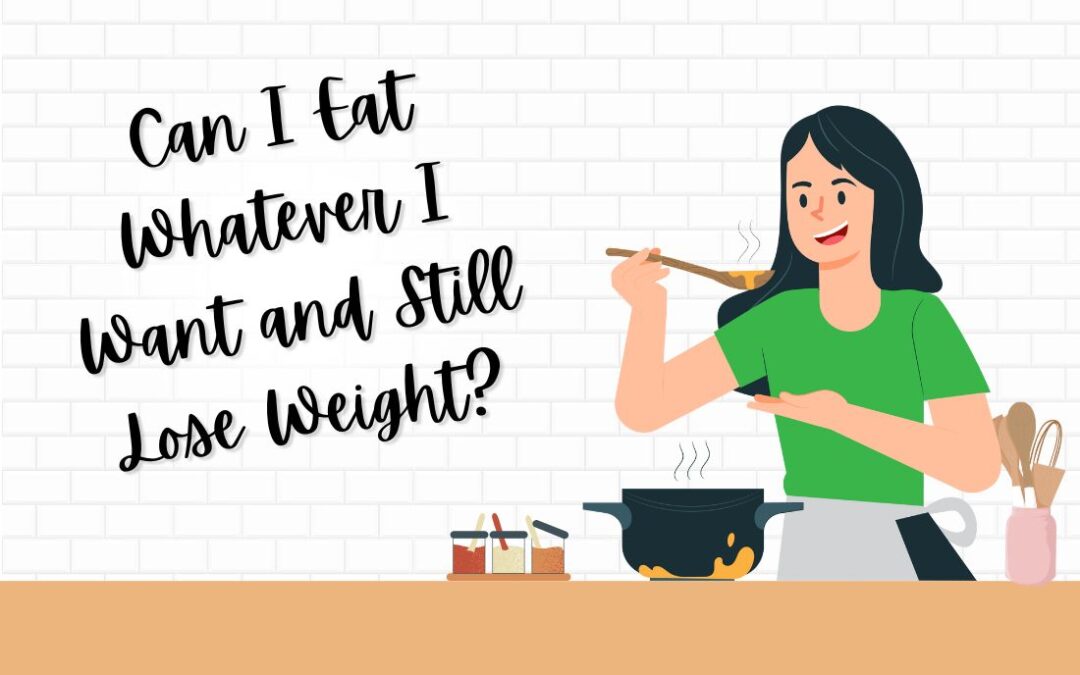Q: Can I eat whatever I want and still lose weight?
A: Yes, you can eat whatever you want and still lose weight, but it comes down to balance, learning what “enough” is, and listening to your body.
Weight loss doesn’t require eliminating your favorite foods; it’s about enjoying them in moderation while focusing on nutrient-dense meals most of the time.
By tuning into your hunger and fullness signals and letting go of restrictive rules, you can create a sustainable approach that allows for both satisfaction and progress toward your goals.
If you want to go deeper, keep reading!
Written by Jenn Hand, Holistic Nutritionist, Board Certified Health Coach, NBC-HWC
Table of Contents
- Getting Off the Diet Train and Becoming a Normal Eater
- What I Know to Be True about Weight Loss
- First, Let’s Debunk Some Weight Loss Myths
- The Role of Highly Processed Foods in Weight Gain
- Why Enjoying Treats in Moderation Is Critical
- What’s the Deal with “Portion Control” and Weight Loss?
- How Mindful Eating Can Help You Lose Weight and Nourish Yourself
- How to Start Eating Mindfully
- Exploring the Mental and Emotional Causes of Overeating
- Physical vs Emotional Hunger
- Managing Stress to Prevent Overeating
- Letting Go of Restrictive Diets Aimed at Weight Loss
- Why Skipping Meals Can Backfire
- Breaking Free From Negative Body Image
- How and Why to Reconnect with Your Body
- How to Lose Weight the Holistic Way
- How Intuitive Eating Can Allow You to Release the Weight
- My Modified Intuitive Eating Method
- Common Questions about Weight Management
Getting Off the Diet Train and Becoming a Normal Eater
If you’re here, then you’ve probably tried hundreds of diets and still find yourself struggling to lose weight.
Maybe you’ve tried a low fat diet and a high fat diet (and everything in between!), you’ve eaten fewer calories and driven yourself crazy calorie counting, and you’ve probably read WAY too many diet books than you’d like to admit.
But losing weight in a way that is sustainable and enjoyable isn’t about restrictive eating or following some intense diet plan. It’s about getting in tune with your body’s true needs and dealing with any emotions and habits that are leading you into binge eating or emotional eating.
It’s a different approach to weight–looking at weight rebalancing rather than the old way we’ve learned to think about weight as deprivation and punishment in the diet world.
Yes, eating healthy foods like fresh fruits and veggies is great. But nobody can “eat healthy” 100% of the time.
Instead, you need to eat in a balanced way, so that you start to crave the foods that truly nourish and fulfill you.
Eventually, you won’t be worried about food cravings leading you astray. You’ll actually start to crave foods that make you feel good. When that happens, you’ll be able to eat whatever you want and still lose weight.
So how do you get to that point?
This post will cover some ways that you can eat in a more nourishing and intuitive manner.
However, I also recommend trying out one-on-one coaching. If you’ve been struggling with this for a long time, it may be helpful to work with someone who can provide guidance as you try a more intuitive path.
What I Know to Be True about Weight Loss
When I was stuck in the cycle of dieting and bingeing, I believed weight loss was all about willpower and cutting calories.
But the more I worked with my body instead of fighting it, the more I realized how much weight loss is tied to self-compassion, trust, and balance.
Through coaching, I’ve seen the same transformation in clients—when they stop chasing perfection and start focusing on nourishing themselves, they begin to shed the emotional weight that holds them back.
The diet world teaches us that weight loss is easy: just eat less and move more.
The reality is that weight is complex. We are physical, mental, emotional and spiritual and our battle with weight reflects that.
Over the years, I’ve learned that weight rebalancing is about so much more than the number on the scale; it’s about creating a life where you feel good in your body and at peace with food.
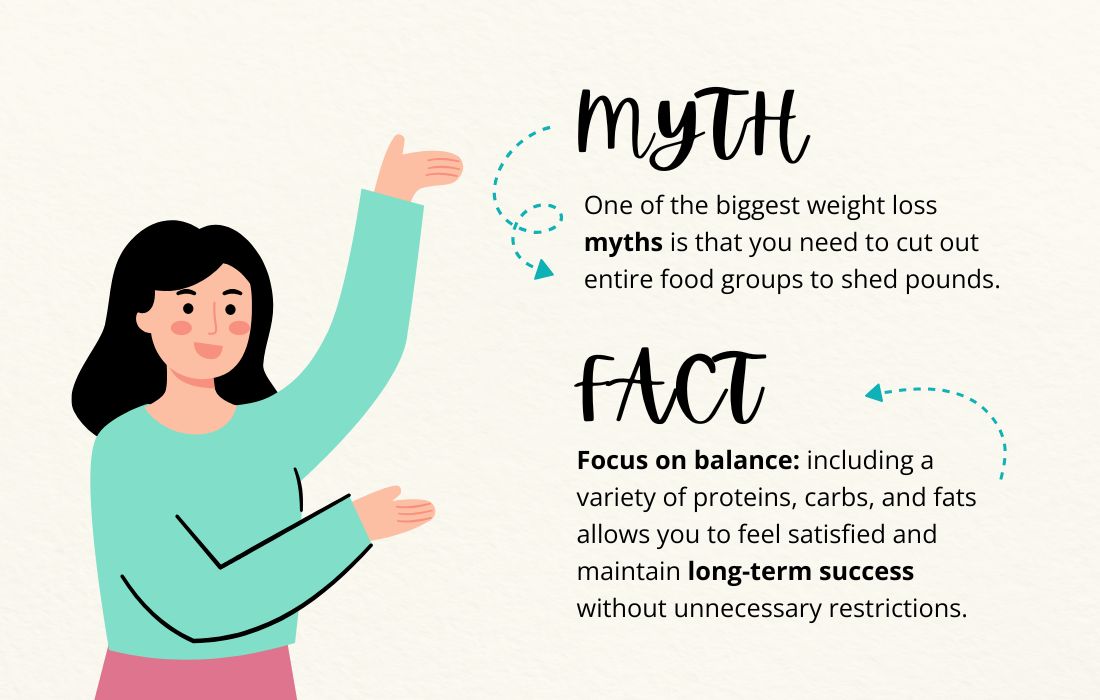
First, Let’s Debunk Some Weight Loss Myths
One of the biggest weight loss myths is that you need to cut out entire food groups to shed pounds.
This approach often backfires, leading to deprivation and bingeing cycles. Instead, focus on balance: including a variety of proteins, carbs, and fats allows you to feel satisfied and maintain long-term success without unnecessary restrictions.
The Role of Highly Processed Foods in Weight Gain
Highly processed foods are often packed with added sugars, unhealthy fats, and artificial ingredients that can increase cravings and contribute to weight gain.
These foods are also less satiating, leading to overeating. Opt for whole, minimally processed alternatives like fruits, vegetables, lean proteins, and whole grains to nourish your body and keep hunger at bay. (But don’t let this make you crazy! Eating some processed food as you learn to find balance will help with long term sustainability.)
🌹 Related: How to Detox If You Ate Too Much Sugar
Why Enjoying Treats in Moderation Is Critical
Completely avoiding treats can make you feel deprived and lead to overeating them later.
Instead, allow yourself to enjoy your favorite indulgences in smaller portions. Pairing treats with a meal or snack, rather than eating them in isolation, can help you savor them without feeling out of control.
Over the years, I’ve realized that the more I told myself I “couldn’t” have something, the more I wanted it!
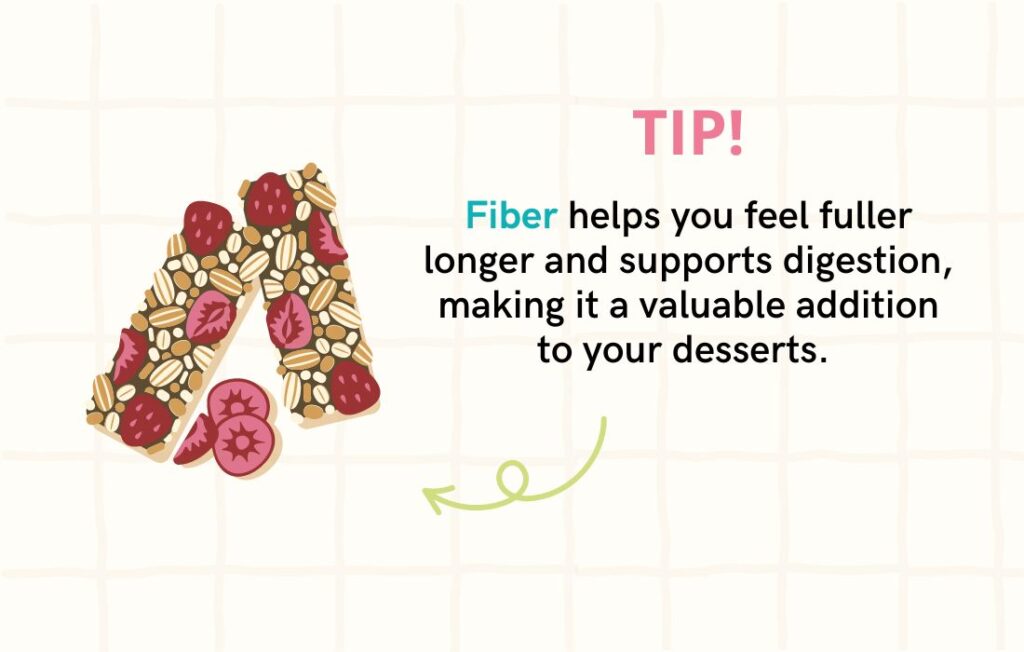
What’s the Deal with “Portion Control” and Weight Loss?
Portion control is less about eating tiny amounts and more about finding the right portion for your body’s needs.
I think to think of it as “how much is enough for my body and its needs?” Eating mindfully can help you recognize when you’re comfortably full, reducing the tendency to overeat.
Tools like smaller plates, paying attention to hunger cues, and slowing down during meals can naturally guide portion sizes.
How Mindful Eating Can Help You Lose Weight and Nourish Yourself
Mindful eating is about being fully present with your food—paying attention to its taste, texture, and how it makes you feel.
This practice helps you reconnect with your body’s hunger and fullness signals, preventing overeating. It also encourages you to make more nourishing choices, leading to sustainable weight loss.
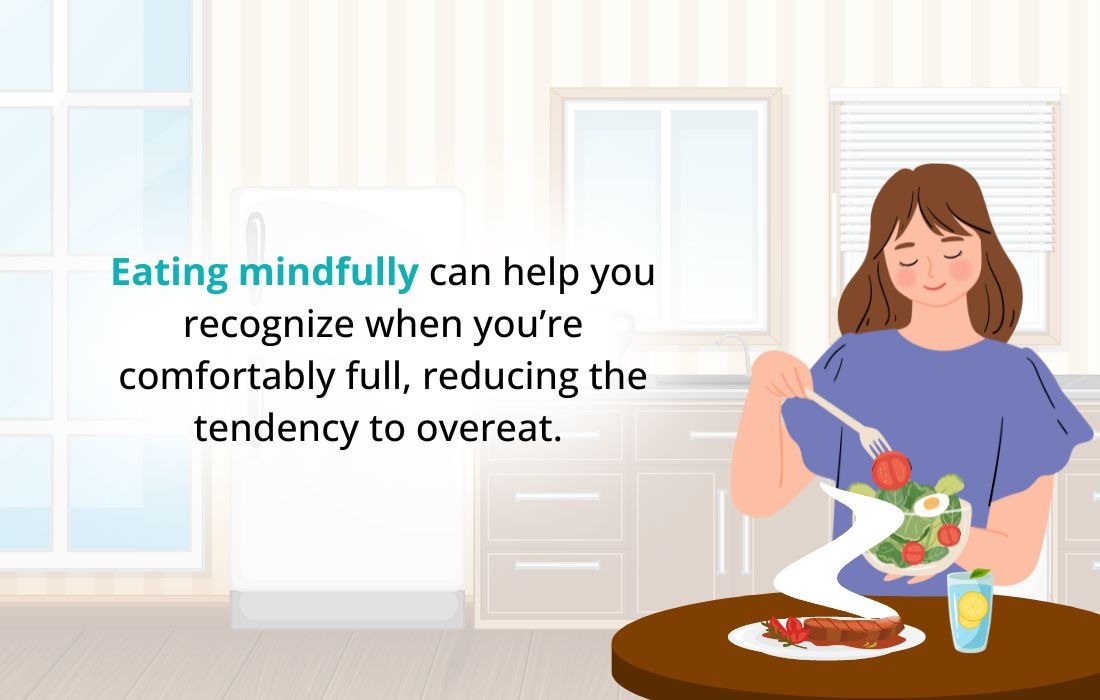
How to Start Eating Mindfully
Begin by slowing down during meals: chew your food thoroughly and pause between bites.
Remove distractions like phones and TVs to focus on your eating habits. Notice how your body feels before, during, and after eating, and aim to stop when you feel satisfied, not stuffed.
Focus on slowing down your eating habit—usually we’re so busy in our society that we’re eating on the run! See if you can make your eating an event and experience. Sit down, put it on a plate, and be in the experience of what you’re eating.
Exploring the Mental and Emotional Causes of Overeating
Overeating can be tied to mental and emotional triggers, such as stress, boredom, or sadness.
Understanding your patterns can help you address the root causes of your eating habits. Journaling, seeking support, or using coping strategies like deep breathing or taking a walk can help you manage emotional eating.
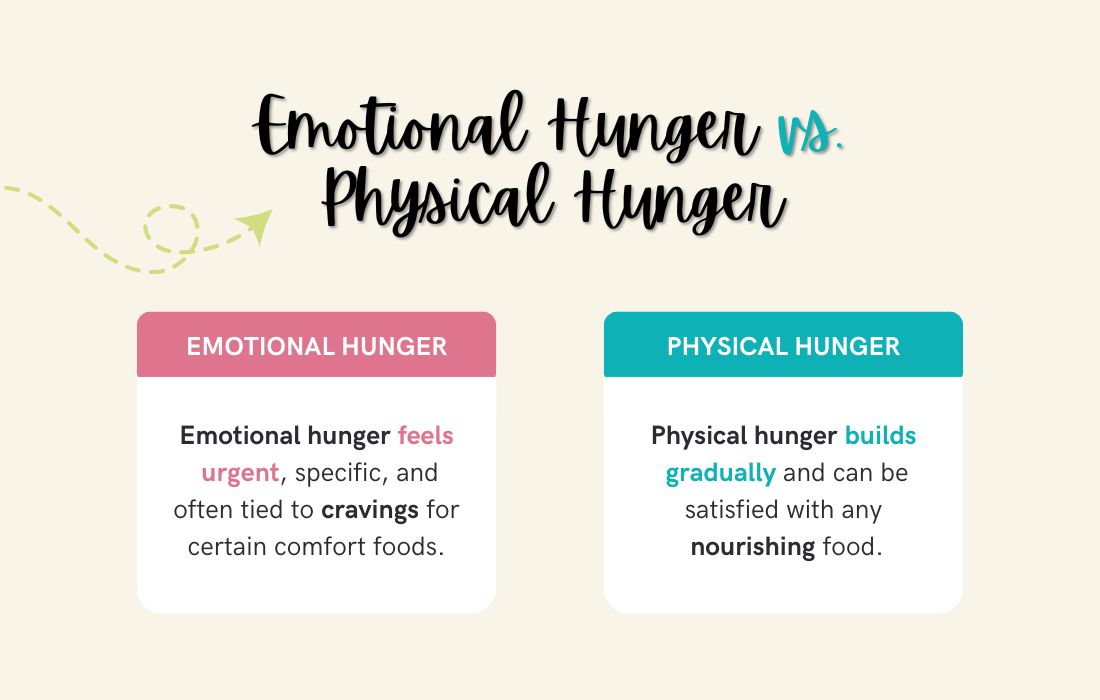
Physical vs Emotional Hunger
Physical hunger builds gradually, is accompanied by physical cues like a growling stomach or low energy, and is satisfied by eating any nourishing food.
Emotional hunger comes on suddenly, is often tied to specific cravings, and is driven by feelings rather than physical need.
Managing Stress to Prevent Overeating
Stress triggers emotional eating by increasing cravings for comfort foods and disrupting hunger signals.
To manage stress, incorporate calming practices like deep breathing, regular exercise, or journaling to address emotions in healthier ways. Building a toolkit of stress-relief techniques helps reduce the urge to turn to food for comfort.
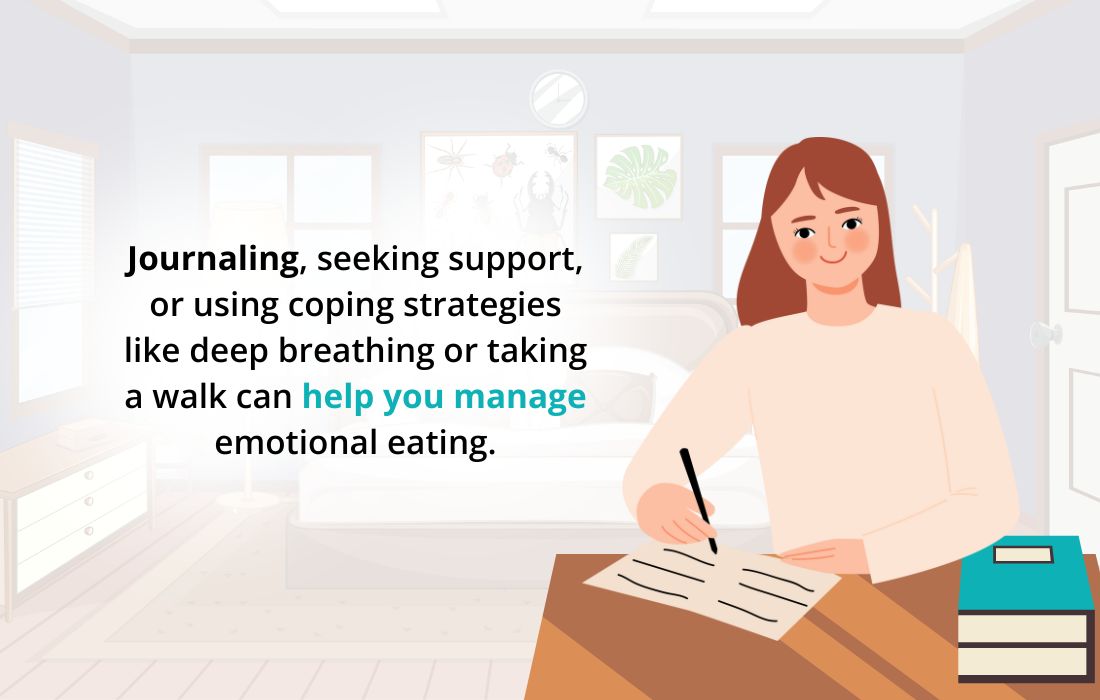
Letting Go of Restrictive Diets Aimed at Weight Loss
While it’s very counterintuitive when you’re wanting to lose weight, do your best to steer clear of strict food plans.
Restrictive diets often create cycles of deprivation and bingeing, making it harder to achieve lasting weight loss. Instead, focus on sustainable approaches like intuitive eating, which encourages listening to your body and enjoying a wide variety of foods without guilt.
This mindset shift helps foster healthier eating patterns over the long term.
Why Skipping Meals Can Backfire
I know, I know – we all have intermittent fasting and “eat as little as possible” in our minds when we think of weight loss!
But skipping meals can leave you feeling overly hungry, which often leads to overeating later in the day. It also disrupts your body’s natural hunger and fullness cues, making it harder to maintain a balanced eating routine.
Regular, nourishing meals keep your energy stable and support your weight loss goals.
Breaking Free From Negative Body Image
Negative body image can trap you in a cycle of self-criticism and unhealthy habits.
Shifting your focus to appreciating what your body does for you and practicing self-compassion can help you create a healthier relationship with yourself. Learning to love your body at every stage is key to lasting change.
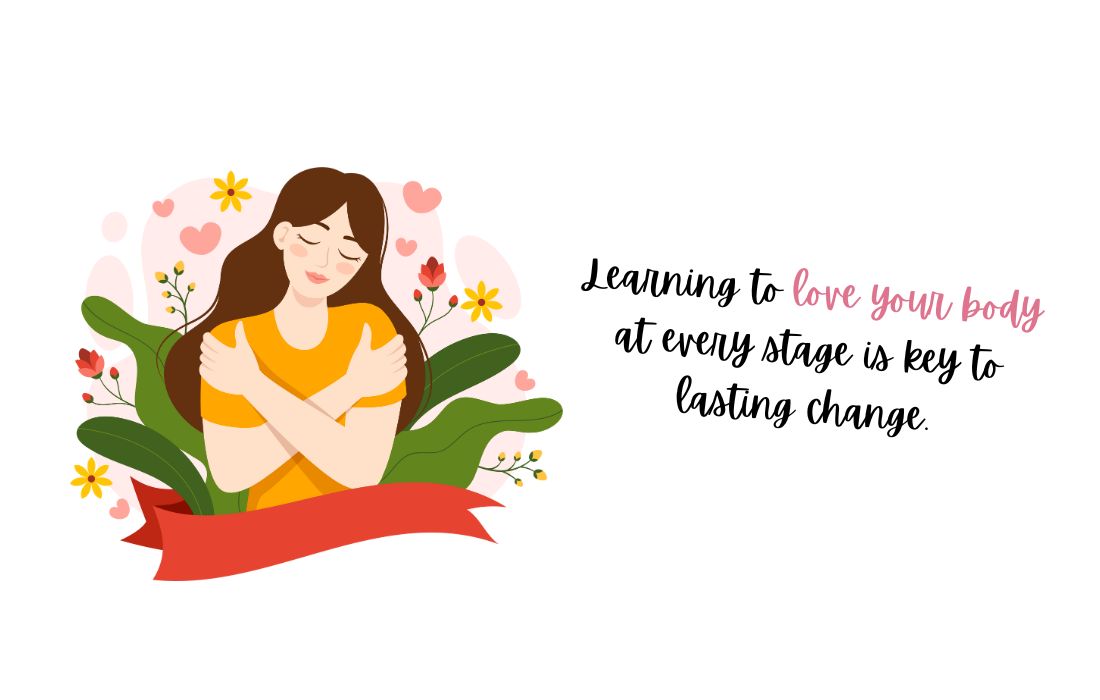
How and Why to Reconnect with Your Body
Reconnecting with your body means tuning into its signals, like hunger, fullness, and movement needs, to create a deeper sense of trust.
Practices like yoga, mindful movement, or body scans can help you listen to your body and foster a sense of connection and respect for its cues. This was a big part of healing on my own journey.
The more I softened my critical view of my body, the more I WANTED to take care of her in a way that was balanced and nourishing.
How to Lose Weight the Holistic Way
A holistic approach to weight loss considers the whole person—physical, mental, emotional, and spiritual health.
This means balancing nourishing foods, enjoyable movement, stress management, and self-care to create a lifestyle that feels sustainable and fulfilling. Holistic weight loss focuses on long-term well-being rather than quick fixes.
How Intuitive Eating Can Allow You to Release the Weight
Intuitive eating encourages you to honor your body’s natural signals and find joy in eating, which helps you break free from dieting.
Over time, this approach allows you to release the weight of rigid rules and emotional burdens around food, creating a healthier and more peaceful relationship with eating.
My Modified Intuitive Eating Method
In my coaching experience, I’ve found that while some clients thrive with the freedom of no food rules, most need more structure to bridge the gap between being on/off a diet and learning to listen to the body.
That bridge is too big for most people, so having some structure is usually helpful. For those who feel lost without guidance, I often recommend starting with eating every 3-4 hours and adding protein at every meal to stay satisfied and avoid blood sugar dips.
Personally, I’ve found that gentle guidelines like these help build trust in your body while preventing the overwhelm of endless decision-making around food. This modified approach blends intuition with practical habits, making it easier to find a rhythm that works for your unique needs.
Common Questions about Weight Management
Is being in a calorie deficit the ONLY thing that matters if you want to lose weight?
No, while a calorie deficit is important for weight loss, weight loss is a complex topic! Other factors like food quality, hunger signals, stress, sleep, and overall lifestyle habits also play a role.
What is a calorie budget and does it even matter?
A calorie budget is the estimated amount of calories you can eat while losing weight, but it’s more effective to focus on balanced meals and mindful eating rather than rigidly tracking numbers.
How much should I eat to lose weight without feeling deprived?
You should aim to eat enough to feel satisfied and energized, incorporating nutrient-dense foods that naturally support your weight goals without leaving you hungry.
Which nutritious foods are also satiating?
Foods high in protein, fiber, and healthy fats—like eggs, beans, nuts, and whole grains—are both nutritious and help keep you full.
Which healthy fats should I add to my daily meals?
Incorporate fats like avocado, olive oil, nuts, seeds, and fatty fish to nourish your body and enhance the flavor of your meals.
Can I still lose weight if I eat junk food occasionally?
Yes! Enjoying your favorite treats in moderation can be part of a balanced approach to weight loss and prevent feelings of restriction.
How can I manage cravings when trying to lose weight?
Cravings can often be managed by eating balanced meals, staying hydrated, and practicing mindfulness to identify emotional versus physical hunger.
What is the best way to handle cravings for unhealthy foods?
Instead of denying yourself, try satisfying the craving with a smaller portion or find a healthier alternative that still feels indulgent.
Why do I eat more when I want to lose weight?
Restrictive dieting can backfire by increasing cravings and hunger, so it’s important to avoid extreme calorie cutting and listen to your body’s needs.
Does not eating after 7pm help with weight loss?
Having a cutoff time for eating is less important than the overall quality and balance of what you eat throughout the day.
Will I gain weight if I eat before bed?
Eating before bed won’t necessarily cause weight gain unless it consistently leads to consuming more calories than your body needs. If you’re hungry before bed, experiment with a light snack to see if it helps satiate you without the feeling of heaviness.
Can exercise compensate for eating whatever I want?
Exercise can support weight loss and overall health, but your body still requires mindful eating and balanced nutrition if weight rebalancing is a focus.
Should I eat foods that are healthy if I don’t really like them?
No, it’s better to find healthy options you genuinely enjoy so you can create sustainable habits without feeling forced or resentful.
Related Articles
⚪ What Is a Healthy Dessert for Weight Loss?
⚪ Intuitive Eating for Weight Loss Tips to Get You Started
⚪ Can You Eat Dessert Everyday and Still Lose Weight?
Get the Normal Eater’s Newsletter
Join 8000+ women who are overcoming overeating, binge eating, and breaking up with dieting forever. Get Jenn’s inspiring and actionable weekly newsletter with the latest posts, podcasts, and tips on how to love your body, find food freedom, and lose weight holistically.
Get the Normal Eater’s NewsletterWork with an Emotional Eating & Holistic Nutrition Coach
Overcome Bingeing and Emotional Eating and Break Up with Yo-yo Dieting
Working with an emotional eating coach and holistic nutritionist can help you get free from the frustrating binge and restrict cycle and stop yo-yo dieting.
You don’t have to be obsessed with food or have a million rules around eating to find your natural weight and learn to love your body. Ready to actually see a lasting change and experience true freedom?
Schedule a 20-min CallAbout the Author:

Jenn Hand has been helping women like you become normal eaters since 2015.
She’s worked with thousands of women, helping them to balance their bodies, end bingeing, stop obsessing over food, and start feeling amazing again. As a board-certified health coach and holistic nutritionist, Jenn knows how to support you in making real positive changes that last.
Her articles have been published on Mind Body Green, Tiny Buddha, Thrive Global and other local and global media platforms. She’s the author of How to Be a Normal Eater and the creator of The Normal Eater’s Club program. Listen to Jenn’s advice and tips on the Cake Doesn’t Count Podcast, or read more of her articles for free on the Food Freedom Blog.
Learn About Coaching!
